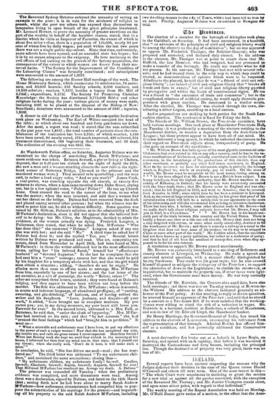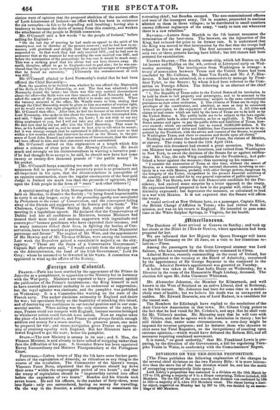IRELAND.
Several reports have been current respecting the reasons why the Judges deferred their decision in the case of the Queen versus Daniel O'Connell and others till next term. One of the most recent is this- " The whole Court were unanimous in declining to grant the motion for a new trial as agaiast all the parties convicted, with the exception of the Reverend Mr. Tierney ; and Mr. Justice Crampton stands alone„ and upon some minor point, with regard to that individual."
The weekly meeting of the Repeal Association was held on Monday. Mr. O'Neill Daunt gave notice of a motion, to the effect that the Asse...
elation were of opinion that the proposed abolition of the ancient office of Lord-Lieutenant of Ireland—an office which has been in existence for six centuries—is felt to be degrading and insulting ; having also a tendency to increase the drain of money from this country, and weaken the attachment of the people to British connexion. Mr. O'Connell said a few words "to the people of Ireland," before sailing for England-
" On the last day of meeting he bad made an appeal to the spirit of his countrymen not to slumber at the present moment ; and he had now to an- nounce, with gratitude and delight, that that appeal bad been most cordially responded to. In that week they had only received 1901., and he had now to announce that at the moment lie was speaking the sum received was 4361., and before the termination of the proceedings he was sure it would be much more. This was a striking proof that his advice had not been thrown away. Be could, therefore, afford to go to England—and to gaol also ; for he was con- vinced that the people were so thoroughly alive to the advantages of tranquillity that he feared no extremity." [Ultimately the announcement of rent was 4532.]
Mr. O'Connell alluded to Lord Normanby's denial that be had been offered the Chief Baronship-
Now, the question to be decided was, whether he was offered the Mastership of the Rolls or the Chief Baronsbip, or not. The first was admitted; Lord Wormanby denied the latter ; but there was this very comical circumstance about the offer—the Rolls were not then vacant, and Lord Normanby had not asked the assent of the gentleman who filled it to make any transfer. When the vacancy occurred in the office, Mr. Woulfe wrote to him, stating that though the Chief Baronsbip would be given to him as a matter of routine right, yet he would waive that right altogether if the Government intended to give Bar. O'Connell that office. After that, be had the honour of an interview with Lord Normanby, who spoke to him about the vacancy ; but he interrupted him, and said, " Spare yourself the trouble, my Lord ; I do not wish to say any thing unpleasant to you, but 1 will not take any office under Government. Be said now that he did not offer him the Chief Baronship. That must be true, as his Lordship said so, and he must be best able to tell what he meant ; but it was strange enough that he understood it differently, and more so that within a few months after that interview he stated in the House, in the pre- sence of Lord John Russell and other members of Government, that the choice had been offered to him, and that statement was not contradicted.
Mr. 0 Connell carried on this explanation at a length which fills about a column of close print in the Morning Chronicle. He dwelt much and strongly on his disinterestedness in waiving a lucrative post : if he had thought fit to accept it, he said, he should now have had some twenty or twenty-five thousand pounds of "the public money" in his pocket. [Mr. O'Connell harps something too much on this string. Does his astuteness fail to perceive, if the pecuniary point is so prominent and all-important in his eyes, that the disinterestedness is susceptible of an opposite construction, since the regular emoluments of the best-paid Judge in Ireland are much less than the proceeds of agitation, levied upon the Irish people in the form of " rents " and other tributes ?] A special meeting of the Irish Metropolitan Conservative Society was held on Monday, to dissolve the Society ; "it being found impracticable to carry it on any longer, owing to the prevailing apathy now manifested by Protestants in the cause of Conservatism, and the consequent falling away of the friends and supporters of the Society and its funds." The Chairman, Captain William Shirley Ball, stated the object of the meeting in a lugubrious speech. He declared that the Conservatives of Dublin had lost all confidence in Ministers, because Ministers had treated their most tried and zealous supporters with ingratitude and contempt—" because gentlemen who have expended their incomes, and in many instances risked their lives, in fighting the battles of Con- servatism, have been marked as partisans, and excluded from Ministerial patronage and favour." The neglect of Mr. West, and the appointment of Mr. Howley and of Mr. Thomas O'Brien, were among the instances. Last week the Repealers gained a considerable majority on the city; registry. "These are the fruits of a Conservative Government. ' Captain Ball afterwards said, "I would exclude from the obloquy cast on the Administration, the head of the Irish Government," Lord De Grey ; whom he assumed to be thwarted in his views. A committee was appointed to wind up the affairs of the Society.



























 Previous page
Previous page